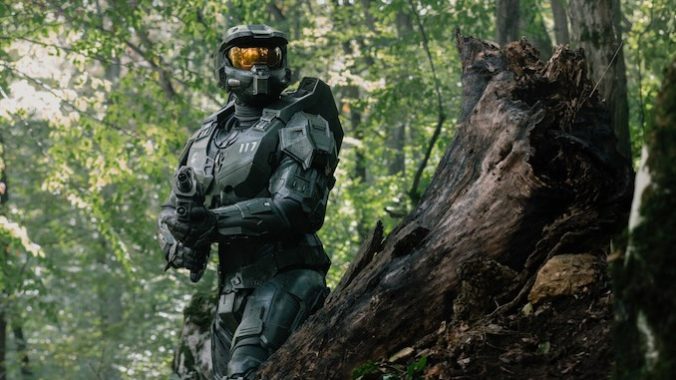Paramount+’s Halo Finds Firmer Footing in a More Consistent Second Season
Photo Courtesy of Paramount+
I have a confession to make. Despite its many flaws, I found quite a few things to enjoy buried in the first season of Paramount+’s TV take on Halo. Sure, it was full of strange storytelling decisions that led to unevenness throughout, it didn’t exactly embody its source material at times, particularly when it came to some off-putting costuming and set design choices, and, to the chagrin of a demanding fanbase, it featured too much of the Master Chief taking his helmet off. But these issues notwithstanding (besides the last one, which I don’t think is a genuine problem because the show is explicitly about him rejecting being a faceless, emotionless killer), what made it interesting is how it delved deeply into the particulars of this nightmarish, far-flung society where children are kidnapped to create super soldiers and a militaristic Earth government crushes those who dissent from its influence.
Perhaps most noticeable of all, it took the series’ protagonist, John-117 or the Master Chief (played by Pablo Schreiber), a character who was thinly characterized in the games so the player could more easily self-insert into his power-armored shoes, and tried to flesh him out beyond being a stoic badass. The show followed John and the rest of the Spartans, soldiers who had been systematically indoctrinated and chemically lobotomized to make them into perfect weapons, as they slowly broke free of their programming. This angle produced the TV series’ most arresting sequences, and it was cathartic to watch as these symbols of the regime began to push back on their upbringing and embrace their buried humanity. However, for each of these well-considered moments, an equal amount of screentime was dedicated to less well-explored backdrops, like a goofy pirate planet or a poorly defined insurrection movement, which contributed to the first season’s previously mentioned inconsistency.
Thankfully, at least through the four episodes we received, the second season of Halo hones in on the elements that worked best from the previous run. While the story picks up where things left off, there is a noticeable difference in its presentation this time around, which likely extends from the fresh faces involved, such as the new showrunner, David Wiener. So far, the new season successfully focuses on the Spartans, the particulars of an uncaring UNSC government, and the escalating conflict with the Covenant to create a largely appealing sci-fi cocktail. Its storytelling can still be a tad head-scratching at times, but there are far fewer narrative dead-ends, making this a more coherent journey.
For franchise neophytes, the Halo games follow an apocalyptic war between the United Nations Space Command (UNSC), the military wing of an imperialistic Earth government, and the Covenant, a theocratic coalition of alien species, as they fight for control of a ring-shaped superweapon. The show takes place in the early phases of this conflict, as the war hero and government-manufactured super soldier John-117, the Master Chief, begins to question his circumstances. The second season picks up six months later as the Chief’s squad, Silver Team, finds themselves sidelined by the new head of the Spartan program, James Ackerson (Joseph Morgan), a man with a secret agenda. As the Covenant continue to wipe out planets in the outer colonies, John comes to believe that the higher-ups in the UNSC may be hiding something about the security of the planet Reach.
Halo has always been defined by a hodgepodge of influences: Ringworld, Dune, Starship Troopers, and Warhammer 40K, to name a few. However, if the games largely emphasized the first two of these through the recurrence of the titular Halo rings and grandiose messianic prophecies, the TV series’ best moments bore more resemblance to the latter pair, foregrounding the brutal realities of being caught between genocidal aliens and a despotic human-run military hegemony.
The show’s focus on the Spartans, symbols of the brutality of the Earth-led regime, continues to be arresting in the latest run, and it’s fascinating to watch as they attempt to balance their place in the war machine with their increasingly human inclinations after removing their emotional suppression pellets. The banter between Kai (Kate Kennedy), Vannak (Bentley Kalu), and Riz (Natasha Culzac) is a much-needed point of levity and one that highlights just how far they’ve come, such as when Vannak begrudging admits to a newfound hobby. Riz has a particularly thoughtful arc over these episodes as she considers her worth outside acting as a government-sanctioned death dealer.
But while John’s buddies find freedom in their regained ability to feel, the Chief comes under increased scrutiny due to becoming “unpredictable.” After witnessing something strange during a mission, he begins to suspect a conspiracy, causing those around him to question his mental state. These sequences are shot with the paranoid headspace of a psychological thriller as John begins to see enemies in every shadow. It’s a shift that at least partially works, in large part because we witness the cracks in the UNSC’s façade alongside our protagonist: inaccurate military broadcasts paint an overly rosy picture of the war effort, holograms with the Chief’s visage encourage enlistment, and we even hear about a Spartan-themed videogame being used as jingoistic propaganda (just like in real life!). Shots of a thoroughly frazzled John and snippets of difficult-to-parse events do a good job of driving us into his fractured headspace as we march toward a conflict that we know is inevitable.
-

-

-

-

-

-

-

-

-

-

-

-

-

-

-

-

-

-

-

-

-

-

-

-

-

-

-

-

-

-

-

-

-

-

-

-

-

-

-

-








































